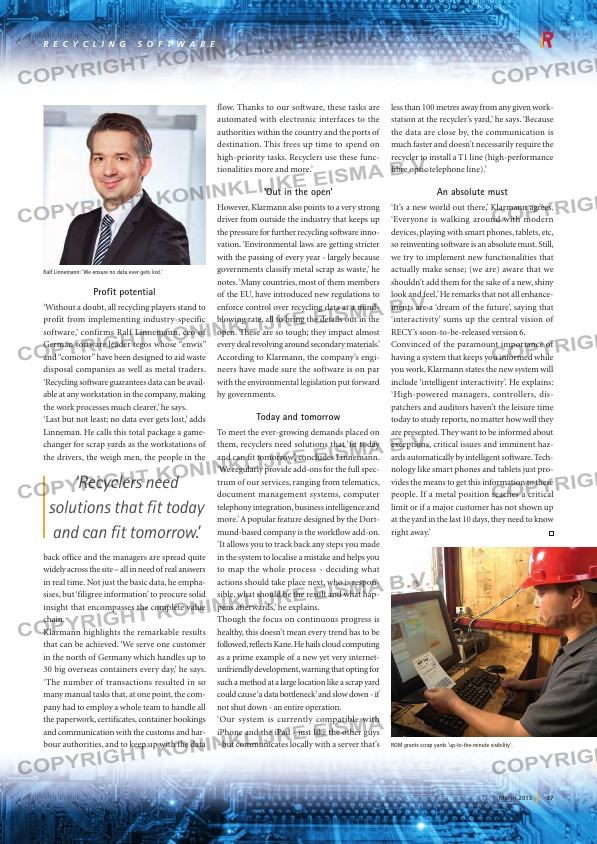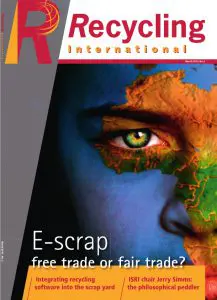Page 37 from: March 2013

37March 2013
Profit potential
‘Without a doubt, all recycling players stand to
profit from implementing industry-specific
software,’ confirms Ralf Linnemann, ceo of
German software leader tegos whose “enwis”
and “comotor” have been designed to aid waste
disposal companies as well as metal traders.
‘Recycling software guarantees data can be avail-
able at any workstation in the company, making
the work processes much clearer,’ he says.
‘Last but not least; no data ever gets lost,’ adds
Linneman. He calls this total package a game-
changer for scrap yards as the workstations of
the drivers, the weigh men, the people in the
back office and the managers are spread quite
widely across the site – all in need of real answers
in real time. Not just the basic data, he empha-
sises, but ‘filigree information’ to procure solid
insight that encompasses the complete value
chain.
Klarmann highlights the remarkable results
that can be achieved. ‘We serve one customer
in the north of Germany which handles up to
30 big overseas containers every day,’ he says.
‘The number of transactions resulted in so
many manual tasks that, at one point, the com-
pany had to employ a whole team to handle all
the paperwork, certificates, container bookings
and communication with the customs and har-
bour authorities, and to keep up with the data
flow. Thanks to our software, these tasks are
automated with electronic interfaces to the
authorities within the country and the ports of
destination. This frees up time to spend on
high-priority tasks. Recyclers use these func-
tionalities more and more.’
‘Out in the open’
However, Klarmann also points to a very strong
driver from outside the industry that keeps up
the pressure for further recycling software inno-
vation. ‘Environmental laws are getting stricter
with the passing of every year – largely because
governments classify metal scrap as waste,’ he
notes. ‘Many countries, most of them members
of the EU, have introduced new regulations to
enforce control over recycling data at a mind-
blowing rate, all to bring the details out in the
open. These are so tough; they impact almost
every deal revolving around secondary materials.’
According to Klarmann, the company’s engi-
neers have made sure the software is on par
with the environmental legislation put forward
by governments.
Today and tomorrow
To meet the ever-growing demands placed on
them, recyclers need solutions that ‘fit today
and can fit tomorrow’, concludes Linnemann.
‘We regularly provide add-ons for the full spec-
trum of our services, ranging from telematics,
document management systems, computer
telephony integration, business intelligence and
more.’ A popular feature designed by the Dort-
mund-based company is the workflow add-on.
‘It allows you to track back any steps you made
in the system to localise a mistake and helps you
to map the whole process – deciding what
actions should take place next, who is respon-
sible, what should be the result and what hap-
pens afterwards,’ he explains.
Though the focus on continuous progress is
healthy, this doesn’t mean every trend has to be
followed, reflects Kane. He hails cloud computing
as a prime example of a new yet very internet-
unfriendly development, warning that opting for
such a method at a large location like a scrap yard
could cause ‘a data bottleneck’ and slow down – if
not shut down – an entire operation.
‘Our system is currently compatible with
iPhone and the iPad – just like the other guys
– but communicates locally with a server that’s
less than 100 metres away from any given work-
station at the recycler’s yard,’ he says. ‘Because
the data are close by, the communication is
much faster and doesn’t necessarily require the
recycler to install a T1 line (high-performance
fibre optic telephone line).’
An absolute must
‘It’s a new world out there,’ Klarmann agrees.
‘Everyone is walking around with modern
devices, playing with smart phones, tablets, etc,
so reinventing software is an absolute must. Still,
we try to implement new functionalities that
actually make sense; (we are) aware that we
shouldn’t add them for the sake of a new, shiny
look and feel.’ He remarks that not all enhance-
ments are a ‘dream of the future’, saying that
‘interactivity’ sums up the central vision of
RECY’s soon-to-be-released version 6.
Convinced of the paramount importance of
having a system that keeps you informed while
you work, Klarmann states the new system will
include ‘intelligent interactivity’. He explains:
‘High-powered managers, controllers, dis-
patchers and auditors haven’t the leisure time
today to study reports, no matter how well they
are presented. They want to be informed about
exceptions, critical issues and imminent haz-
ards automatically by intelligent software. Tech-
nology like smart phones and tablets just pro-
vides the means to get this information to these
people. If a metal position reaches a critical
limit or if a major customer has not shown up
at the yard in the last 10 days, they need to know
right away.’
‘Recyclers need
solutions that fit today
and can fit tomorrow.’
Ralf Linnemann: ‘We ensure no data ever gets lost.’
ROM grants scrap yards ‘up-to-the-minute visibility’.
R E C Y C L I N G S O F T W A R E
RI_2-RI-Software.indd 37 06-03-13 14:39



